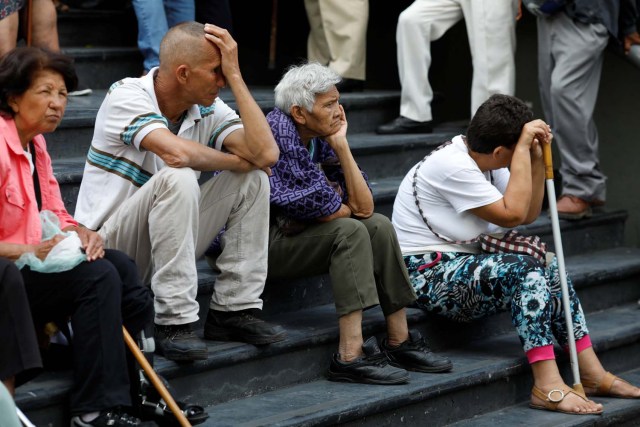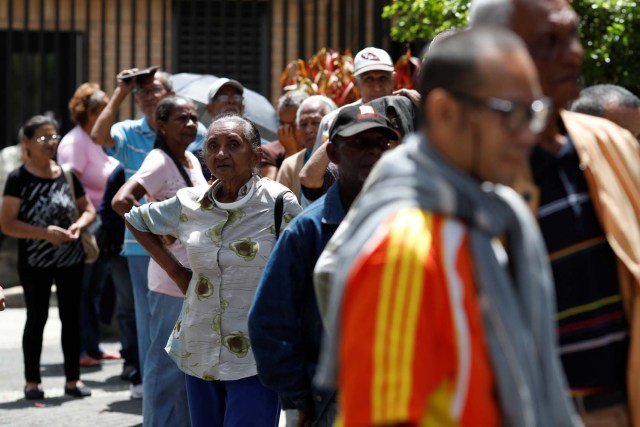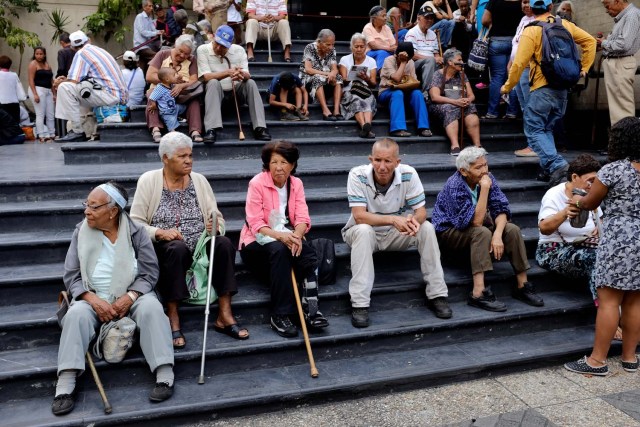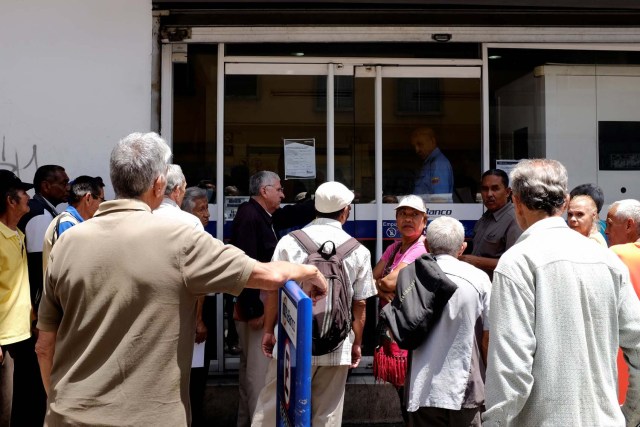
In recent years, the elderly in Venezuela have been condemned to survive in misery, caused by the complex humanitarian emergency that still persists in the country, but also due to the absence of effective protection policies on the part of Chavismo.
Yanitza Martínez // La Patilla Correspondent
In several studies the Non-Governmental Organization “Convite”, states that 84% of the elderly in Venezuela suffer intensely from the crisis that surrounds all Venezuelans, and this is particularly acute for those suffering of chronic diseases, whose treatments they cannot pay for because they lack the financial resources, not counting the severe food insecurity suffered by many grandparents.
In any country in the world, a person who has worked and paid social security, upon obtaining retirement, can live peacefully on the pension paid by the State, covering all their basic needs.
In Venezuela, that is a chimera. The reality is that with just 7 U.S. dollars a month is all they receive as a pension, with this amount retirees cannot even cover their food needs for a week, much less buy medicines. For example, an antihypertensive can cost more than 5 dollars.
“Convite” points out that 7 out of 10 older adults in Venezuela depend on a third party to live and this is due, among other factors, to the progressive loss of purchasing power.
Many of those who support these older adults are their children or any other family member who has emigrated, and if luck accompanies them, they can moderately afford some of the needs of those who have been left adrift in Venezuela.
In this regard, Luis Francisco Cabezas, General Director of the NGO Convite, mentioned that this portion of the population has lost the purchasing power of the pension as their main income, which is why they turn to third parties, not only relatives who are outside the country, but also relatives such as neighbors, friends, acquaintances or organizations and foundations dedicated to providing care to these people in a state of vulnerability.
Convite provides care to this part of the population in Caracas, Barquisimeto, Maracaibo, Ciudad Bolívar, Mérida, Puerto la Cruz, Puerto Ordaz and Valera with humanitarian action programs.
This NGO in the various studies it has carried out has found that 91% of the elderly state that it is very expensive to live in Venezuela, while 58% do not have access to periodic medical check-ups.
Pensioners Have To Decide Between Eating, Buying Medicine Or Paying For Services

Living on the Social Security pension in Venezuela has become a juggling act to survive. And according to surveys carried out by Convite, 46% of older adults must decide between buying medicines, buying food or paying for public services.
The testimony of Mrs. Eloísa Lameda makes evident this terrible reality. She suffers from rheumatoid arthritis and to endure the intense pain, she only has money to buy Diclofenac potassium and it is difficult for her to follow the treatment indicated by the specialist.
“My son is in Peru, but the little he sends my husband and me, we spend on food,” Eloísa points out. She adds that in that South American country the situation for Venezuelans is becoming more complex every day, which is why remittances have been decreasing over the past months.
Hunger Gains Ground
Food intake in the elderly in Venezuela has decreased considerably: 2 out of 10 older adults suffer chronic malnutrition.
Francelia Ruiz, who also works at Convite, points out that her inquiries show that 28% of older adults barely manage to eat two meals a day and others must significantly reduce their meal portions. Only a minority of grandparents have the possibility of consuming animal protein at least three times a week.
Loneliness Increases Fragility

Experts point out that Venezuela is the worst country to grow old, mainly due to the economic situation and the loneliness consequence of the exodus of millions of Venezuelans, who have had to flee the country and leave their parents alone.
Although forced migration can solve part of the economic problems, there is another heartbreaking aspect in the lives of the elderly: they have been literally abandoned. It is very common to know cases where entire families have been disintegrated by emigration.
“They took everything from us, they separated us from our children,” said Beatriz Durán in tears, who lives with her husband, an oncology patient who, although the disease is under control, requires an expensive treatment that is sometimes covered when in any of the centers of the Social Security Administration receives one or any other of the needed drugs. Otherwise, her children must solve how they can to afford to find it and acquire it.
This elderly couple have been living alone in Lara State for more than 5 years and they have had to go through a calamitous path to support themselves. Perhaps the most difficult part is the emotional part, because it is not only about the material things, according to Beatriz.
She explains that several members of her family have died in recent years, so there are fewer members residing in the country every day. Beatriz can’t wait for the day when she can hug her children and grandchildren again. They are part of the statistics of Venezuelan emigrants.
Death Is Lurking
Reversing the damage that the separation has left in the Venezuelan elderly population will not be an easy task, since a large number of deaths have resulted from loneliness and defenselessness.
In data provided by the report on the victimization of the elderly carried out by Convite, 102 violent deaths were registered only in the first half of 2021: 23.5% died due to domestic accidents; 19.6% by blade weapons; 4.9% by firearms; 13.7% caused by beatings; 12.7% for being run over; 6.9% due to suicides; 5.9% due to lack of attention; 3.9% due to mechanical asphyxia; 2% for torture.
This same report corresponding to the first semester of 2022, documented a significant increase in suicide among older adults, a dramatic situation that is related to the absence of relatives who have emigrated to other countries.
It was learned that about 13% of the older adults who were part of the sample for these studies live alone, which makes them more attractive targets of crime, which uses the loneliness of these people to steal, kidnap and even murder.
Failed Public Policies

The absence of public policies that benefit the elderly has marked the management of the Chavista regime in Venezuela in recent years, which with pyrrhic “bonds” (handouts and special payments) has sought to support this important part of the population, accentuating the complex humanitarian emergency caused by the absence of medicines and the deplorable conditions in which public hospitals are kept in the country.
One of those policies, considered unsuccessful, is the “Misión Amor Mayor” (Mission Elderly Love), a social program created during the administration of former President Hugo Chávez Frías and which recently reached the 11th anniversary of its creation.
Its purpose was to “promote the inclusion” of older adults who worked independently and who did not contribute to the Venezuelan Institute of Social Security (IVSS).
But that inclusion is far from reality. Nearly 5 million older adults today try to survive with just 130 bolivars a month and with the pyrrhic “bonuses” (handouts) that Chavismo grants through the national identity card. These are “pañitos calientes” (warm cloths = improvised remedy) that do not solve the underlying problem of the elderly Venezuelans.

